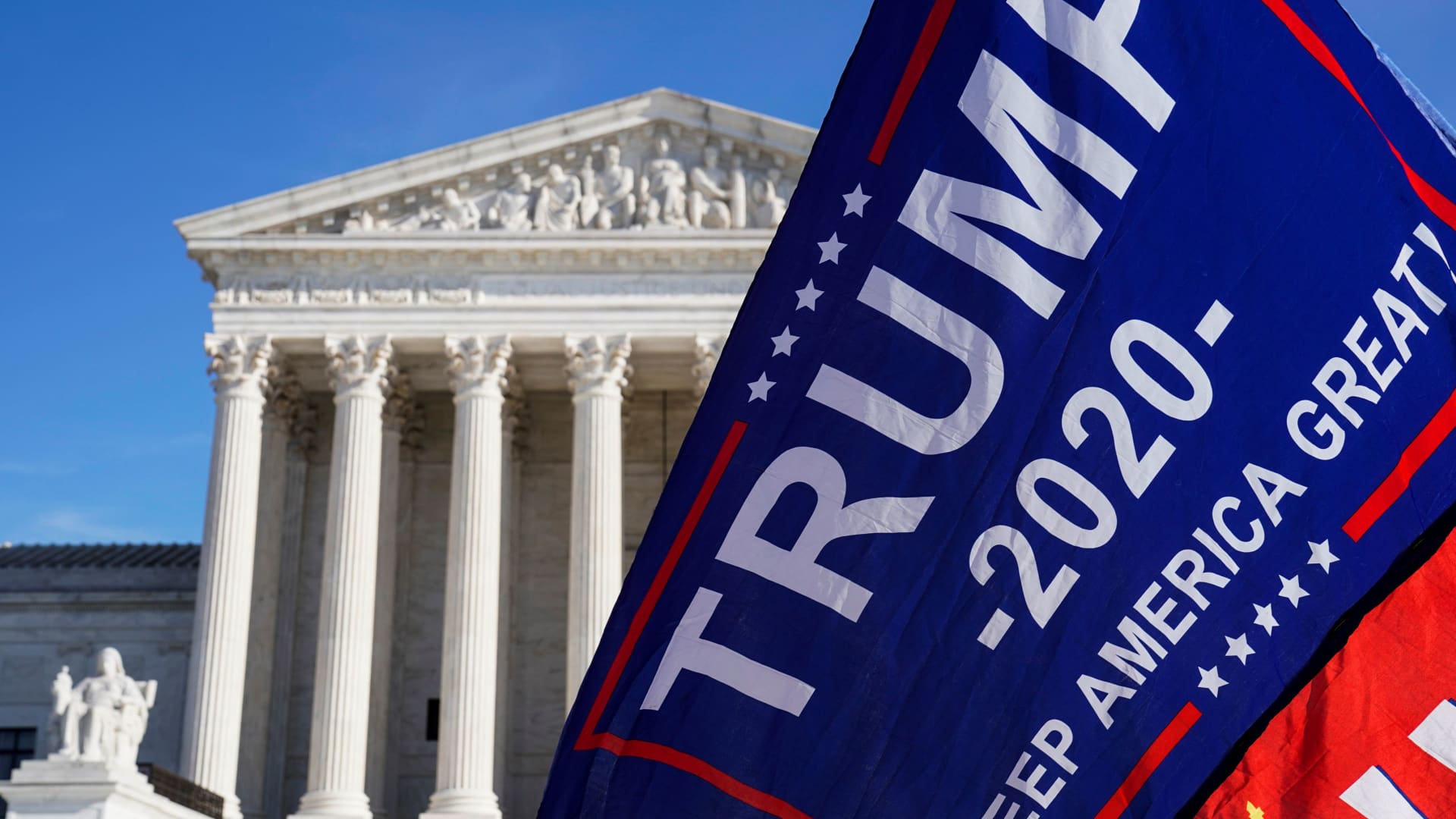U.S. President Donald Trump delivers an update on the so-called Operation Warp Speed program, the joint Defense Department and HHS initiative that has struck deals with several drugmakers in an effort to help speed up the search for effective treatments for the ongoing coronavirus disease (COVID-19) pandemic, in an address from the Rose Garden at the White House in Washington, U.S., November 13, 2020.
Carlos Barria | Reuters
The Supreme Court on Thursday appeared likely to reject former President Donald Trump’s sweeping claim of absolute immunity from criminal prosecution for acts in office — but the court also cast doubt on parts of the federal election interference case against the former president.
The question before the court — whether an ex-president can be prosecuted for official acts performed while in office — was an existential one for special counsel Jack Smith’s case charging Trump with illegally trying to overturn his 2020 election loss to President Joe Biden.
Smith was sitting in the courtroom on Thursday, as attorney Michael Dreeben argued the government’s case.
In early questioning, Justice Sonia Sotomayor sounded skeptical of the argument by Trump’s lawyers that a president should be immune from prosecution for anything official performed while in office.
“I am having a hard time thinking that creating false documents, that submitting false documents, that ordering the assassination of a rival, that accepting a bribe and countless other laws that could be broken for personal gain, that anyone would say that it would be reasonable for a president or any public official to do that,” Sotomayor said to Trump attorney John Sauer.
Later on in the questioning, several conservative justices appeared to seriously consider that the prospect of prosecution could have a chilling effect on a president in office.
“I’m not concerned about this case, but I am concerned about future uses of the criminal law to target political opponents based on accusations about their motives,” said Justice Neil Gorsuch.
Justices appointed by Republican presidents also questioned specific parts of the case Smith is mounting against Trump. Justices Samuel Alito and Brett Kavanaugh both expressed skepticism about a key part of the case against Trump for election interference, known as the fraud conspiracy statute.
The high court’s eventual ruling carries profound consequences for some of Trump’s other pending criminal cases that hinge on his conduct in the White House.
Along with Smith’s case in Washington, D.C., Trump is charged in Georgia with attempting to reverse his loss to Biden in that state’s 2020 contest.
Trump has repeatedly claimed that if a president is at risk of criminal prosecution for official acts, then the president is effectively hamstrung, or “chilled” as Sauer put it, in their actions and decisions by the fear of future prosecution.
But Justice Ketanji Brown Jackson raised the opposite concern.
“You seem to be worried about the President being chilled,” she told Sauer. “I think that we would have a really significant opposite problem: if the President wasn’t chilled, if someone with those kinds of powers, the most powerful person in the world with the greatest amount of authority could go into office knowing that there would be no potential penalty for committing crimes.”
“I’m trying to understand what the disincentive is from turning the Oval Office into you know, the seat of criminal activity in this country,” she added.
Trump was not at the Supreme Court to hear the oral arguments because he was required to attend his New York criminal trial.
The former president is on trial in Manhattan Supreme Court for allegedly falsifying business records when, after becoming president in 2017, he reimbursed his then-lawyer for a $130,000 hush money payment to a porn star.
Attorneys for Trump and Smith began arguing at 10 A.M. before the nine justices, three of whom were nominated by Trump during his one term as president.
The Supreme Court agreed to take up the case after two lower courts rejected Trump’s claim that he is immune from the indictment being prosecuted by Smith.
Supporters of U.S. President Donald Trump wave a flag at the Supreme Court as the court reviews a lawsuit filed by Texas seeking to undo President-elect Joe Biden’s election victory in Washington, U.S., December 11, 2020.
Joshua Roberts | Reuters
By weighing in on the immunity question, the high court effectively delayed by months the election interference case, which is on hold in the U.S. District Court in Washington, D.C. The Supreme Court could rule on the issue quickly, but it tends to save its biggest rulings for the end of the term, which typically wraps up in late June or early July.
Even if the justices reject Trump’s argument and allow Smith’s case to resume, it might not go to trial until after the Nov. 5 presidential election. Trump, the presumptive Republican presidential nominee, has tried to delay all four of his pending criminal trials past November.
The federal election interference trial was originally set to begin on March 4.
Some legal experts critical of Trump slammed the court for keeping Trump’s immunity claim alive after a federal appeals court in D.C. forcefully rejected it in early February.
The Supreme Court “has already unduly delayed this matter,” said Norm Eisen, a lawyer and former aide to House Democrats during Trump’s first impeachment, in a press call Wednesday.
The indictment brought by Smith charges Trump with four criminal counts, including conspiracy to defraud the United States. Smith alleges that Trump tried to subvert the 2020 results by spreading false election fraud claims, organizing slates of fake pro-Trump electors in states Biden won, and trying to exploit a violent mob of Trump’s supporters that stormed the Capitol on Jan. 6, 2021.
This is developing news. Please check back for updates.

